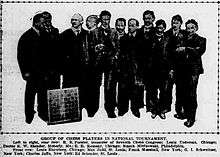Louis Uedemann

Louis Uedemann (10 January 1854 – 22 November 1912) was an American chess master.
He twice won the U.S. Open Chess Championship at Excelsior 1900 (the first Western Chess Association Championship) and Excelsior 1902 (the 3rd WCA-ch).[1]
He developed a code that was later refined by Mr. D. A. Gringmuth, of St. Petersburg, "a leading Russian problem composer," [Steinitz] and adapted for use with telegraphs for cable matches. Gringmuth's notation was first used in the telegraphic match between London and St Petersburg in November 1886 (see Chess notation#Uedemann code).
He also won at Chicago 1890,[2] took 7th at St. Louis 1890 (Jackson Showalter won), tied for 4-5th at Lexington 1891 (Showalter and William Pollock won), took 3rd at Chicago 1903 (the 4th WCA-ch, Max Judd won), took 2nd, behind Stasch Mlotkowski, at St. Louis 1904 (the 5th WCA-ch), took 3rd at St. Louis 1904 (the 7th American Chess Congress, Frank Marshall won),[3] tied for 3rd-5th at Excelsior 1905 (the 6th WCA-ch, Schrader won), took 5th at Chicago 1906 (the 7th WCA-ch, Wolbrecht won), took 3rd at Excelsior 1907 (the 8th WCA-ch, Michelsen won), took 4th at Excelsior 1908 (the 9th WCA-ch, Elliot won), took 3rd at Excelsior 1909 (the 10th WCA-ch, Oscar Chajes won), and took 3rd at Chicago 1910 (the 11th WCA-ch, Wolbrecht won).[4]
He played for the Chicago Chess Club in cable matches against Twin Cities CC (1904), Franklin CC of Pennsylvania (1904 and 1905), Brooklyn CC (1905), and Manhattan CC (1905).[5]
References
- ↑ https://web.archive.org/web/20091028083510/http://www.geocities.com/SiliconValley/Lab/7378/history.txt
- ↑ Edo Ratings, Uedemann, L
- ↑ The Frank James Marshall Electronic Archive and Museum: Tournament and Match Record
- ↑ "Archived copy" (PDF). Archived from the original (PDF) on 2007-07-04. Retrieved 2007-07-04. Name Index to Jeremy Gaige's Chess Tournament Crosstables, An Electronic Edition, Anders Thulin, Malmö, 2004-09-01
- ↑ Welcome to the Chessmetrics site Archived 2006-04-14 at the Wayback Machine.
External links
- Louis Uedemann player profile and games at Chessgames.com